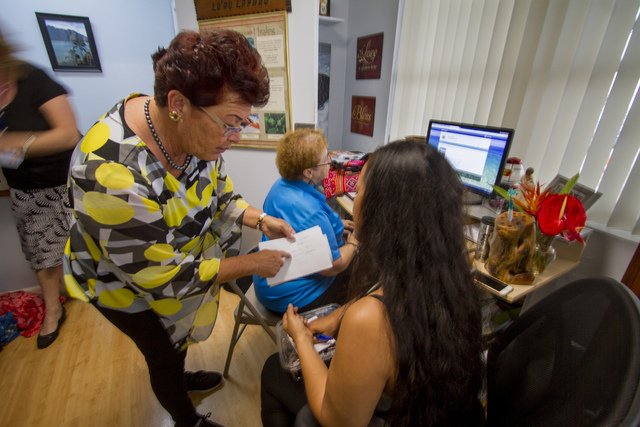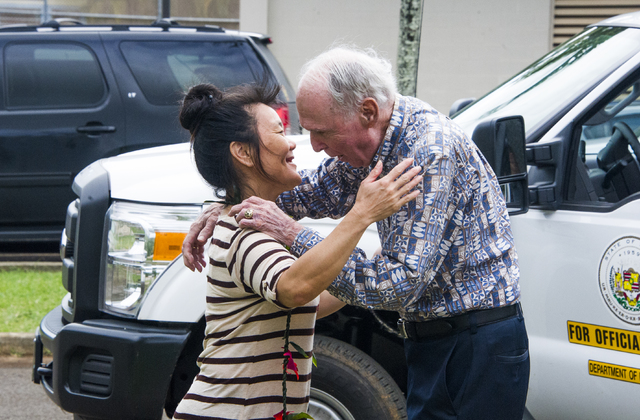Churches and nonprofits help ex-prisoners stay off the streets

DENNIS ODA / DODA@STARADVERTISER.COM
Kimi, right, got information from Francine Dudoit-Tagupa, director of Native Hawaiian healing at Waikiki Health, about filling out a registration form at the center. Behind them is Cheryl Moreno, patient service representative and eligibility specialist at Waikiki Health.

CRAIG T. KOJIMA / CKOJIMA@STARADVERTISER.COM
Waikiki Health is leading a hui of churches and nonprofits supporting released inmates to keep them from ending up homeless. Michelle Higa received a lei from Jack Sullivan upon her release from the Women’s Community Correctional Center in Kailua on Friday.


After serving a five-year sentence for forgery, theft and counterfeiting, Michele Higa walked out of the Women’s Community Correctional Center in Kailua on Friday with no cash, no identification, no place to call home and a “90 percent chance” of ending up homeless immediately upon release, according to WCCC’s warden.
But as soon as Higa exited WCCC as a free woman and put down the black garbage bag that contained her worldly possessions, she was greeted with hugs, a ti leaf-and-orchid lei and a ride to one of Waikiki Health’s clinics, where she got help getting her identification and medical insurance, followed by a ride to Waikiki Health’s Next Step Shelter in Kakaako.
“I’m glad to be free, and I’m glad I can contribute to society,” Higa said. “But I don’t know where I would have gone.”
Until Waikiki Health began leading a hui of churches and nonprofit groups into Oahu’s prisons and jail and the Federal Detention Center over the last few months to try to prevent inmates from becoming homeless, WCCC Warden Eric Tanaka said newly released convicts such as Higa “end up right back on the street,” adding, “Now, with our community partners, we’re taking a step in the right direction.”
No one knows how many of Hawaii’s former prisoners are among the more than 7,000 people who live homeless across the islands.
Aloha United Way has commissioned the Hawaii Appleseed Center for Law and Economic Justice to gather data on four distinct groups that rely on homeless-related services: young adults who age out of the foster care system; recently discharged and recovering addicts; the chronically homeless who rely on hospital emergency rooms; and newly released prisoners.
Don't miss out on what's happening!
Stay in touch with breaking news, as it happens, conveniently in your email inbox. It's FREE!
Appleseed’s interim report is due Nov. 30, and the final report is scheduled for Feb. 14, according to AUW.
The state Department of Public Safety declined a request by the Honolulu Star-Advertiser to observe the efforts by Waikiki Health, First L.A.P. (Life After Prison), the Pu‘a Foundation, the Lili‘uokalani Children’s Center and the Oahu Going Home Consortium — a network of public, private and faith-based organizations — as they work with prisoners inside WCCC, Oahu Community Correctional Center and Waiawa Community Correctional Center in addition to the Federal Detention Center near Honolulu Airport.
The groups receive support and assistance from Good News Jail and Prison Ministry; Makiki Christian Church; the Office for Social Ministry and the Prison Ministry of the Roman Catholic Diocese of Honolulu, Oahu Going Home Consortium; St. Ann’s, St. John Vianney, St. Anthony of Padua and St. George Catholic churches; Mystical Rose Oratory on the Saint Louis School/Chaminade University campus; Maryknoll Affiliates Hawaii; and the Lay Marianist Community of Hawaii.
Monica Lortz, DPS’ re-entry coordination officer, said DPS appreciates the efforts to help prisoners avoid becoming homeless once they’re discharged.
“These service providers are servicing a great need to help cut down and prevent these individuals from becoming homeless,” Lortz said.
For newly released prisoners, “you have no idea where to go or who to see,” she said. “They couldn’t cash a check because they lack ID. How are you going to get a job without ID? You can’t. And when you’re an ex-offender, it’s not like you’re just going to ask somebody for help. You tend to shy away from drawing attention to yourself, because that’s been the norm.”
Two weeks ago Matthew Taufete’e, an ex-con and ex-gang member who served nearly six years in Halawa Prison for manslaughter and third-degree assault, saw two newly released prisoners wandering outside Halawa’s gates with a familiar look of bewilderment.
The options for the two men were clear to Taufete’e, 48, who now runs First L.A.P., a Palolo Valley nonprofit group that houses and helps 16 former prisoners to restart their lives.
With little support and likely even less money, the pair would probably end up homeless — or commit new crimes so they could return to prison or jail, where they would at least be given food and a place to sleep, Taufete’e said.
Given the alternative of sleeping on the streets, where they face the possibility of assault and robbery or worse, Taufete’e believes the men would revert to bad habits.
“They were just walking around with no place to go,” Taufete’e said. “I said, ‘Hey, how you guys doing?’ They said, ‘We just maxed out.’ I said, ‘Where you guys going?’ They said they don’t know.”
Taufete’e then added, “They’re going to commit another crime.”
The new effort to help prevent convicts from becoming homeless began in August 2015 when a newly released inmate from OCCC wandered into “Auntie Francine” Dudoit-Tagupa’s office at Waikiki Health looking for someone to help him apply for medical insurance.
“It was the beginning of my journey,” said Dudoit-Tagupa, director of Native Hawaiian healing for Waikiki Health.
After connecting the ex-con with a Waikiki Health eligibility specialist, the prisoners’ “coconut wireless” began crackling with word that Auntie Francine could help prepare for life after prison.
Inmates at OCCC and the Federal Detention Center began writing Dudoit-Tagupa asking for applications for medical insurance, which they need to get into treatment programs after they’re released, she said.
The process required constant letters back and forth between the prisoners and Dudoit-Tagupa, who has now added the additional chores to her normal work load with no extra compensation.
She’s now given a Hawaiian name to the efforts by all of the groups trying to prevent more prisoners from becoming homeless: “Pu‘uhonua — A place of safe refuge.”
Fourteen prisoners who originally wrote to Dudoit-Tagupa have since been released and gone into treatment. Then 15 more showed up in person, and Dudoit-Tagupa directed them to Waikiki Health’s Next Step Shelter or referred them to Waikiki Health’s Care-A-Van program to help them set up a permanent mailing address or get their IDs.
In June, Dudoit-Tagupa spoke to 225 inmates at Waiawa Community Correctional Center. The next month she started working with 15 female inmates at OCCC on what she calls a “Going Home Plan for Success.”
“Most of them needed help with medical insurance, transportation, IDs and a permanent mailing address,” Dudoit-Tagupa said.
Later in July she helped 84 male OCCC inmates with similar issues. And this month she started working with more OCCC inmates facing release in August or September.
Two of them have since gone directly to the Next Step Shelter, and three received medical insurance so they can get into treatment programs.
Sheila Beckham, Waikiki Health’s CEO, said her organization “feels privileged” to help newly released prisoners.
“It’s important to help the soon-to-be-released from prison because it’s an opportunity for Waikiki Health to provide resources, support, and direction for this vulnerable, marginalized population,” Beckham said in a statement. “With the ability to provide medical care, housing, and job training, we foresee positive outcomes and WH feels privileged to work with these folks.”
When she got out of the women’s prison Friday, Higa also received a white plastic laundry basket filled with toiletries that she’ll need at Next Step, along with a pillow and pillowcase, secondhand towels and sheets.
Among those greeting Higa outside WCCC’s gate was Toni Bissen, executive director of the Pu‘a Foundation, who said Higa “has no family. She has no resources.”
In return, Higa said that all of the support that now surrounds her “feels wonderful.”
9 responses to “Churches and nonprofits help ex-prisoners stay off the streets”
Leave a Reply
You must be logged in to post a comment.




Prisoners should be better prepared for their release. Nobody should have to leave without valid ID and a 3 months foster place for those who do not have family ties.
Prisoners are almost set up to fail once they leave prison.
All the Churches and Non-profits who work with released ex-inmates are doing an excellent job with what they have to work with. They must have our support.
All churches and non-profits are trying to help prisoners and homeless, it is just the limitations placed upon them by the state that makes it difficult. I am part of a church that provides food regularly to needy, but the state makes new regulations that are financially problematic, such as storage of non-perishable items, dietary information, counseling, etc. and we find ourselves having a harder time providing what people need. It would be best if the state and others would as churches and non-profits, “what can we do to support your volunteer work” instead of “we’ll tell you all of the hurdles you have to meet or stop helping.
Their good works are assisted by their tax exempt status.
Churches pay taxes, just not the GET on donations, but property, GET on all purchases, FICA, etc. all are taxes paid by churches. Tax exempt doesn’t mean they don’t pay taxes.
etire; You are such a jack-wagon! Why did you find it necessary to politicize this article?
Churches do way more for the public then you are obviously aware of and more than make up for property tax proceeds. Here are just a few stats for what Catholics “alone” are doing;
In the year 33 there were no hospitals. Today, one out of five people in this country receive their medical care at a Catholic hospital.
In the year 33 there were no schools. Today, the Catholic Church teaches 3 million students a day, in its more than 250 Catholic Colleges and Universities, in its more than 1200 Catholic High Schools and its more than 5000 Catholic grade schools.
Every day, the Catholic Church feeds, clothes, shelters and educates more people than any other organization in the world.
Now add to this all the other denominations and you will see that this world would be in sad shape were it not for religions!
Without a support system to help ex-cons they will end up right back in prison….unfortunately there are not enough work release programs for soon to be parolees and time served inmates to have a job when released….those who have a job have the best chance of staying out of prison……